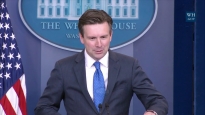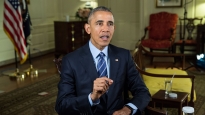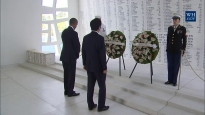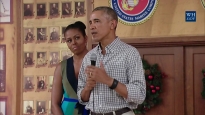President Obama Awards Medal of Honor to Korean War Heroes
May 02, 2011 | 25:34 | Public Domain
President Obama awards the Medal of Honor to Private First Class Anthony T. Kaho’ohanohano, U.S. Army, and Private First Class Henry Svehla, U.S. Army, for conspicuous gallantry. Both men were killed In action during the Korean War.
Remarks by the President Awarding the Medal of Honor to Private First Class Anthony Kaho'ohanohano and Private First Class Henry Svehla
12:08 P.M. EDT
THE PRESIDENT: Good morning, everybody. Please be seated. On behalf of Michelle and myself, welcome to the White House. To our many guests from Hawaii, aloha. And thank you, Chaplain Carver, for that wonderful invocation.
I think we can all agree this is a good day for America. Our country has kept its commitment to see that justice is done. The world is safer; it is a better place because of the death of Osama bin Laden.
Today, we are reminded that, as a nation, there’s nothing we can’t do —- when we put our shoulders to the wheel, when we work together, when we remember the sense of unity that defines us as Americans. And we’ve seen that spirit -— that patriotism -— in the crowds that have gathered, here outside the White House, at Ground Zero in New York, and across the country -- people holding candles, waving the flag, singing the National Anthem -- people proud to live in the United States of America.
And we’re reminded that we are fortunate to have Americans who dedicate their lives to protecting ours. They volunteer. They train. They endure separation from their families. They take extraordinary risks so that we can be safe. They get the job done. We may not always know their names. We may not always know their stories. But they are there, every day, on the front lines of freedom, and we are truly blessed.
I do want to acknowledge before we begin the ceremony two individuals who have been critical as part of my team who are here today: First of all, I think somebody who will go down as one of the finest Secretaries of Defense in our history, Secretary Bob Gates, who is here. (Applause.) And sitting beside him, someone who served with incredible valor on behalf of this country and is now somebody who I think will go down as one of the greatest Secretaries of Veterans Affairs in our history -- Eric Shinseki. (Applause.)
Now, I have to say that as Commander-in-Chief, I could not be prouder of our men and women in uniform. That is true now, in today's wars. It has been true in all of our wars. And it is why we are here today.
Long ago, a poet of the First World War wrote of the sacrifice of young soldiers in war:
They shall not grow old, as we that are left grow old,
Age shall not weary them, nor the years condemn.
At the going down of the sun and in the morning
We will remember them.
Today, we are joined by two American families who six decades ago gave our nation one of their own —- Private First Class Henry Svehla and Private First Class Anthony Kaho’ohanohano.
They did not grow old. These two soldiers made the ultimate sacrifice when they were just 19 and 21 years old. Age did not weary them. In the hearts of their families, they remain forever young —- loving sons, protective brothers, hometown kids who stood tall in America’s hometown -- in America’s uniform.
Today, we remember them. And we honor them with the highest military decoration that our nation can bestow -- the Medal of Honor. In so doing we also honor their families, who remind us that it is our extraordinary military families who also bear the heavy burden of war.
We are joined by members of Congress who are here. We very grateful for you. We are also joined by leaders from the Army and our Armed Forces, including Chairman of the Joint Chiefs of Staff Admiral Mike Mullen and the Vice Chairman, General Jim “Hoss” Cartwright. Where -- there they are right there. (Applause.)
And this is not in the script, but let me just acknowledge that without the leadership of Bob Gates, Mike Mullen, Hoss Cartwright, today and yesterday would not have happened. And their steadiness and leadership has been extraordinary. I could not be prouder of them, and I am so grateful that they have been part of our team. (Applause.)
I especially want to welcome some of those who fought so bravely 60 years ago —- our inspiring Korean veterans -- Korean War veterans who have made the trip here. And I also want to acknowledge those who are welcoming two more American heroes into their ranks -- members of the Medal of Honor Society. Thank you so much for your presence. (Applause.)
This past November, I paid a visit to South Korea -- a visit that coincided with the 60th anniversary of the start of the Korean War, as well as November 11th, Veterans Day. And I was privileged to spend part of the day with our troops and with dozens of veterans of the Korean War -- members of a generation who, in the words of their memorial here in Washington, fought for “a country they never knew and a people they never met.”
It was a generation that included Private First Class Anthony Kaho’ohanohano. Tony grew up in Hawaii, in Maui. He learned early that we have a duty to others -- from his father, a dedicated police officer, and his mother, who devoted herself to their nine children. Tony was a tall guy. He loved Hawaii, swimming in the ocean, playing basketball —- sounds like my kind of guy. (Laughter.) His siblings remember him as the big brother -- quiet but strong -- who took care of them, stood up for them in the neighborhood, and who would treat them to ice cream.
Tony’s loyalty to family was matched by his love of country -- even though Hawaii wasn’t even a state yet. By September 1951, the Korean War had been raging for more than a year, and Tony was part of the 17th Infantry Regiment, 7th Infantry Division, which had been fighting for strategic hills that could shape the course of the war.
His squad was near a village called Chupa-ri when they came under a ferocious attack. With the enemy advancing, with his men outnumbered, Tony made a decision. He ordered his squad to fall back and seek cover. And then Tony did something else. He stayed behind. Machine gun in hand, he laid down fire so his men could get to safety. He was one American soldier, alone, against an approaching army.
When Tony was wounded in the shoulder, he fought on. He threw grenade after grenade. When his weapon ran out of ammunition, he grabbed another. And when he ran out of ammo, he reached for the only thing left -- a shovel. That’s when the enemy overran his position. And in those final moments, the combat was hand to hand.
It was that bravery -- that courage -- of a single soldier that inspired his men to regroup, to rally and to drive the enemy back. And when they finally reached Tony’s position, the measure of his valor became clear. After firing so many bullets, the barrel of his machine gun was literally bent. But Tony had stood his ground. He had saved the lives of his men.
After his death, Tony was awarded the Army’s second highest award for valor -- the Distinguished Service Cross. But his family felt he deserved more. And so did Senator -- and World War II vet -- Danny Akaka. We’re honored that Senator Akaka has joined us, as well as Mazie Hirono. And obviously we are extraordinarily grateful that we’re joined by another Senator and a Medal of Honor recipient, Dan Inouye. Thank you so much for your presence. (Applause.)
Now, Hawaii is a small state, but the Kaho’ohanohanos are a very big family. In fact, I went to high school with one of their cousins, Whitey. Tell Whitey I said, “How’s it?” (Laughter.)
This is a remarkable family. Service defines them. Tony’s father and all six sons served in the military. Another member of the family has served in Afghanistan. Nearly 30 members of the family have traveled from Hawaii to be here, including Tony’s sister Elaine and brother Eugene.
For the sacrifice that your family endured, for the service that your family has rendered -- thank you so much. Mahalo nui loa.
I would ask that you all join me in welcoming Tony’s nephew George, who worked for many years to get his uncle the honor that he deserved. George. (Applause.)
MILITARY AIDE READS THE CITATION: The President of the United States of America, authorized by act of Congress, March 3, 1863, has awarded, in the name of Congress, the Medal of Honor to Private First Class Anthony T. Kaho’ohanohano, United States Army, for conspicuous gallantry and intrepidity at the risk of his life above and beyond the call of duty.
Private First Class Anthony T. Kaho’ohanohano, Company H, 17th Infantry Regiment, 7th Infantry Division, distinguished himself by extraordinary heroism in action against the enemy in the vicinity of Chupa-ri, Korea, on one September 1951. On that date, Private First Class Kaho’ohanohano was in charge of machine-gun squads supporting the defense positioning of Company F when a numerically superior enemy force launched a fierce attack. Because of the enemy’s overwhelming numbers, friendly troops were forced to execute a limited withdrawal. As the men fell back, Private First Class Kaho’ohanohano ordered his squad to take up more defensible positions and provide covering fire for the withdrawing friendly force.
Although having been wounded in the soldier during the initial enemy assault, Private First Class Kaho’ohanohano gathered a supply of grenades and ammunition and returned to his original position to face the enemy alone.
As the hostile troops concentrated their strength against his emplacement and in an effort to overrun it, Private First Class Kaho’ohanohano fought fiercely and courageously, delivering deadly accurate fire into the ranks of the onrushing enemy.
When his ammunition was depleted, he engaged the enemy in hand-to-hand combat until he was killed. Private First Class Kaho’ohanohano’s heroic stand so inspired his comrades that they launched a counter-attack that completely repulsed the enemy.
Upon reaching Private First Class Kaho’ohanohano’s emplacement, friendly troops discovered 11 enemy soldiers lying dead in front of the emplacement, and two inside it, killed in hand-to-hand combat.
Private First Class Kaho’ohanohano’s extraordinary heroism and selfish devotion to duty are in keeping with the finest traditions of military service, and reflect great credit upon himself, the 7th Infantry Division and the United States Army.
(The Medal is presented.) (Applause.)
THE PRESIDENT: About the time that Tony was inspiring his men, another young soldier was joining up with the 7th Infantry Division in Korea -- Private First Class Henry Svehla. He grew up in New Jersey. He loved fishing on the Jersey shore. He was one of six kids and the youngest son, but the one who seemed to take care of everybody else.
His sister Dorothy remembers how their mom would be in the kitchen, at the end of a long day, trying to cook dinner for six kids. Henry -- a teenager -- would walk in, grab his mother’s hand and dance her around the kitchen. “If anybody needed him,” said Dorothy, “Henry was there.”
And he was there for America, in Korea, as the war neared its third and final year. Henry knew the dangers. And in one of his last letters home, he wrote, “I may not return.”
That June of 1952, the heat was unbearable. The monsoon rains and mosquitoes were relentless. But the 7th Infantry Division pushed on -- probing enemy lines, fighting bunker by bunker, hill by hill. And as Henry and his company neared the top of one hill, the rocky slopes seemed to explode with enemy fire. His unit started to falter, and that’s when Henry made his move.
He stood up. He looked ahead. And he charged forward into a hail of bullets. Those who were there describe how he kept firing his weapon, kept hurling grenades, and how -- even after being wounded in the face -- he refused medical attention and kept leading the charge.
That’s when an enemy grenade landed among his men. Every human instinct, every impulse, would tell a person to turn away. But at that critical moment, Henry Svehla did the opposite. He threw himself on that grenade. And with his sacrifice, he saved the lives of his fellow soldiers.
Henry Svehla’s body has never been recovered. That’s a wound in the heart of his family that has never been fully healed. It’s also a reminder that, as a nation, we must never forget those who didn’t come home, are missing in action, who were taken prisoner of war -- and we must never stop trying to bring them back to their families.
Henry was awarded the Distinguished Service Cross, but his family believed that he had earned this nation’s highest military honor. They contacted their congressman and his staff, who made it their mission, and we thank Representative Bill Pascrell for making this day possible.
Henry’s parents and brothers did not live to see this day, but two of his sisters -- Dorothy and Sylvia -- are with us. Dorothy, Sylvia, you remind us that behind every American who wears our nation’s uniform stands a family who serves with them. And behind every American who lays down their life for our country is a family who mourns them, and honors them, for the rest of their lives. Every day, for nearly 60 years, you have lived the poet’s words:
At the going down of the sun and in the morning
We will remember them.
And so I want to conclude today by inviting everyone to join me in welcoming Henry’s sister Dorothy to the stage for the presentation of the medal. (Applause.)
MILITARY AIDE READS THE CITATION: The President of the United States, authorized by Act of Congress, March 3, 1863, has awarded, in the name of Congress, the Medal of Honor to Private First Class Henry Svehla, United States Army, for conspicuous gallantry and intrepidity and the risk of his life above and beyond the call of duty. Private First Class Henry Svehla distinguished himself by acts of gallantry and intrepidity above and beyond the call of duty while serving as a rifleman with F Company, 32nd Infantry Regiment, 7th Infantry Division, in connection with combat operations against an armed enemy in Pyongony, Korea, on 12 June, 1952.
That afternoon, while Private First Class Svehla and his platoon were patrolling a strategic hill to determine enemy strength and positions, they were subjected to intense enemy automatic weapons and small arms fire at the top of the hill. Coming under heavy fire, the platoon’s attack began to falter. Realizing the success of mission and the safety of the remaining troops were in peril, Private First Class Svehla leapt to his feet and charged the enemy positions, firing his weapon and throwing grenades as he advanced.
In the face of this courage and determination, the platoon rallied to attack with renewed vigor. Private First Class Svehla, utterly disregarding his own safety, destroyed enemy positions and inflicted heavy casualties, when suddenly, fragments from a mortar round exploding nearby seriously wounded him in the face. Despite his wounds, Private First Class Svehla refused medical treatment and continued to lead the attack.
When an enemy grenade landed among a group of his comrades, Private First Class Svehla, without hesitation and undoubtedly aware of extreme danger, threw himself upon the grenade. During this action, Private First Class Svehla was mortally wounded. Private First Class Svehla’s extraordinary heroism and selflessness at the cost of his own life, above and beyond the call of duty, are in keeping with the highest traditions of the military service and reflect great credit upon himself, his unit and the United States Army.
(The Medal is presented.) (Applause.)
THE PRESIDENT: Let’s give both families a big round of applause -- (applause) -- for Anthony and for Henry. (Applause.)
CHAPLAIN CARVER: Please join me in prayer.
Gracious God, you’ve stirred our hearts once again today as we’ve heard the accounts of two great American soldiers, who valued the lives of those under their care more than their very own.
You’ve told us in the Holy Scripture that there’s no greater love than this. And so, would you etch this eternal truth in our own hearts as we carry out our responsibilities to you, our families and our great nation.
Bless the young men and women of our armed services, who walk in the footsteps of both Anthony and Henry, protecting and defending our lives in freedom’s cost. And, Lord, continue to bless, empower and give great wisdom to our President, Barack Obama, as he leads our nation in these challenging times.
And God bless America. In your holy name, we pray. Amen.
AUDIENCE: Amen.
THE PRESIDENT: Thank you so much, everyone. Please enjoy the reception.
And again, to the families, we could not be prouder of Anthony and Henry. We are grateful for their sacrifice. We are grateful for your sacrifice. You have made this country safer. Tony and Henry stand as a model of courage and patriotism.
God bless you. And God bless the United States of America. Thank you, everyone. (Applause.)
END
12:32 P.M. EDT
|
January 3, 2017
|
December 31, 2016
|
December 27, 2016
|
December 27, 2016
|
|
December 26, 2016
|
December 24, 2016
|
December 21, 2016
|
December 17, 2016
|
- &lsaquo previous
- 1
- 2
- 3
- 4
- 5
- 6
- 7
- 8
- 9
- …
- next &rsaquo







